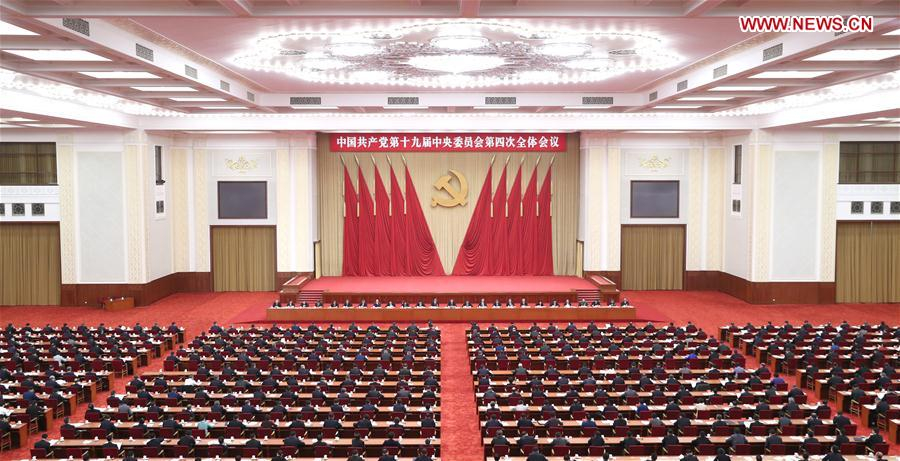China to manage a globalized economy against the closing tide
(来源:CGTN,2019-11-5)
Editor's note: Xia Lu is an assistant professor at National Academy of Development & Strategy of Renmin University of China. Gao Lei is an assistant professor at Centre for Xi Jinping Thoughts on Opening-Up of Beijing Colleges' Collaborative Innovation Centre for Theories & Practice of Open Economy, University of International Business & Economics. The article reflects the author's opinions and not necessarily the views of CGTN.
China is continuing its promotion and contribution to a shared future for world economy in the new era, a vow made by President Xi Jiping in his keynote speech at the opening ceremony of the 2nd China International Import Exposition (CIIE) in Shanghai on Tuesday.
The CIIE was initiated last year just at the conjuncture of the 40th anniversary of China's Reform and Open-up cause, as a strong and clear signal showing that China would not cease its steps to manage, maintain, and expand an open and shared economy against the deglobalizing and closing tide emerged at the end of 2016. Instead, China will take firm steps to build a cooperated, innovated, and shared open world economy.
In fact, at the beginning of 2017, President Xi Jinping has already made it very clear in his "defending globalization" speech at World Economy Forum in Davos of Switzerland that globalization in itself has done nothing wrong.
Instead of criticizing and blaming the practice of globalization, world leaders should start to think more about how to guide and manage this unstoppable globalizing trend so as to reduce its negative impacts and deliver its benefits to the peoples of all countries and all nations as much as possible. When talking about the violent weapon abuse problem in some Western countries, we hear often that "guns don't kill people; people kill people." Similarly, it could also be applied here with little amendment that "globalization don't create crisis; people make crisis."
Probably the origins of this problem is resulting from a sort of political deficit rather than a financial deficit -- a deficit of governance, which is also widely observed by OECD experts. The conundrum facing world leaders is not that they make wrong decisions but that they nearly make no decisions.
Making wrong decisions, there may still be a chance to do some remedy; while making no decisions, the world might be beyond save. Everyone knows what is to be done, but the tricky part is how to make it.
More than one hundred years ago, Russian communist leader Lenin published a pamphlet titled "What Is To Be Done," yet if one reads it thoroughly one may find it filled with "how should the Bolshevik party solve the urgent issues in the revolutionary movement." For now, perhaps the only effective way out is to strengthen the state capacity to offer more efficient governance, especially the governance in the economic field.
Therefore, it is no coincidence that the main theme of the 4th plenary session of the 19th Central Committee of the CPC held in last week is to aim at this target. The modernization of state governing body and governability is China's goal for deeping reform by the mid-21st century and its keys to overcome obstacles in its rapid development for four decades.

To fulfill this goal, one of the most significant elements lies in the institution. In his keynote speech, President Xi made it clear that "proper business environment provides the necessary condition for enterprises to survive and thrive." Without strong state capacity and effective state governability, no proper business environment can be guaranteed.
In World Bank's Doing Business Report 2020, China ranks 31st, up by 15 places from last year's ranking of 46th, not an achievement that could be attained in a weak state. But China is moving forward, by removing major constraints on economic development as well as gearing up reforms regarding key links and areas. In so doing, it fulfills the goal of modernizing the system and capacity for governance as an institutional support for high-standard opening-up and high-quality development.
Having a deep root in its traditional culture and practice, China's institutions bear strong indigenous features. Being indigenous, in the view of some Western scholars, means being different from them, and in turn means being "unmodern.'
This view is now losing attraction. Comparative research on political institutions has begun to turn from issues of institutional design to issues of institutional effects. Instead of assuming that once adopting "modern" institution copied from the West everything is going to be fine, scholars and analysts have become increasingly interested in examining how variation in the stability and enforcement of formal rules will shape political leaders' expectations and strategy.
Previously, China's contribution to the world is confined to not increasing economic burden to the world community; but nowadays, it is time to expand and extend this contribution by providing positive and effective way to manage and guide a more open economy.
附原文链接:https://news.cgtn.com/news/2019-11-05/China-to-manage-a-globalized-economy-against-the-closing-tide-Ln36odJKEM/index.html